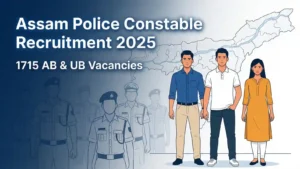
Railway has released the notification for the recruitment of the post of constable in RPF / RPSF. This article provides exam pattern, syllabus and RPF Constable Previous Year Question Papers.
Age
- Minimum Age – 18 years
- Maximum Age – 25 years
Educational Qualifications
- Candidates should be 10th pass from a recognized Board of education.
Scheme of Examination
This examination includes only one paper:
| Subjects | MCQ | Marks | Time |
|---|---|---|---|
| General Awareness | 50 | 50 | |
| Arithmetic | 35 | 35 | |
| General Intelligence and Reasoning | 35 | 35 | |
| Total | 120 | 120 | 90 minutes |
RPF Constable Previous Year Question Paper
| Paper Year | Download Links |
|---|---|
| RPF Constable (2018) Official Paper (Held On 04 Feb 2019) | Download |
| RPF Constable (2018) Official Paper (Held On 19 Feb 2019) | Download |
| RPF Constable (2018) Official Paper (Held On 02 Feb 2019) | Download |
| RPF Constable (2018) Official Paper (Held On 03 Feb 2019) | Download |
| RPF Constable (2018) Official Paper (Held On 03 Feb 2019 Shift 2) | Download |
| Constable 2018 – All Hindi Papers | Download |
RPF Constable Syllabus (Detailed)
| Subjects | Description |
|---|---|
| General Awareness | Current Affairs Recent political events Socio-economic developments Global news impacting India Events and Developments in our Society Cultural festivals and celebrations Social movements and protests Technological advancements Indian History Ancient civilizations Medieval dynasties Independence struggle Art & Culture Classical and folk arts Literary movements and figures Architectural heritage Geography Physical features Environmental issues Demographic trends Economics Market trends Fiscal policies Economic reforms General Polity Governance structures Political ideologies Administrative frameworks Indian Constitution Fundamental rights and duties Directive principles Amendments and judicial interpretations Sports National and international tournaments Athlete achievements Sporting controversies General Science Recent discoveries and innovations Scientific theories and principles Environmental conservation efforts |
| Arithmetic | Number systems Whole numbers Decimal and Fractions Relationships between numbers Fundamental Arithmetical Operations Percentages Ratio and Proportion Averages Interest Profit and Loss Discount Use of tables & graphs Mensuration Time & Distance Ratio & Proportion |
| General Intelligence & Reasoning | Analogies Spatial Visualization Spatial Orientation Problem Solving Analysis Decision Making Visual Memory Similarities & Differences Discriminating Observation Relationship Concepts Arithmetical Reasoning Classification of Verbal & Figure Arithmetic Number Series Syllogistic Reasoning Non-Verbal Series Coding & Decoding Statement Conclusion |


